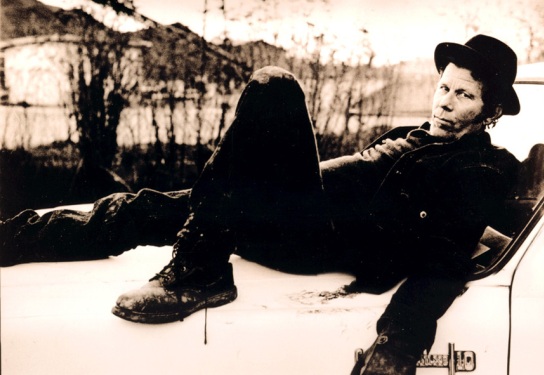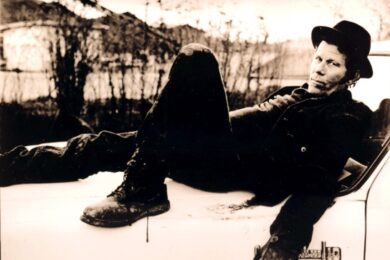I have noticed recently that I find myself lost, unawares and generally unconcerned whenever conversations about today’s music, the latest band, or the best album of the year so far crop up. My immediate reaction is to stare blankly into the nearest object, which more often than not resorts in some surly, noticeably under-evolved individual immediately leaning over and enquiring as to whether I am ‘fucking his pint’.
Even though my ignorance concerning today’s music scene could be easily rectified (thus saving a lot of grief) the fact of the matter is that I find myself satisfied at what some would call the musical impasse that I have reached. I don’t get bored of looking incredibly stupid headbanging to Kyuss’ Welcome to Sky Valley, have deep introspective moments whilst listening to Van Morrison’s Astral Weeks, come close to tears every time I hear Nina Simone’s voice, and picture myself on stage alongside the members of Bauhaus. This is obviously not to say that I will outright refuse any recommendations made to me or fight anyone that thrusts the new British Sea Power album under my nose, but the truth is that I have dug myself into a very comfortable musical hole and plan on staying here for the foreseeable future.
At the centre of my musical hideaway, the foundation, that old reliable shotgun that one uses to shoot out the TV every time June Sarpong comes on is none other than Tom Waits.
With journalists desperately trying to find other musical comparisons, Waits is usually lumped alongside the likes of Nick Cave, Leonard Cohen or Captain Beefheart. The truth is he is nothing like these other pioneers, but an individual who can’t be put into a category, so instead writers go about setting up wholly inappropriate categories such as ‘industrial blues’ or ‘post-Beefheartian funeral rock’ and thus misleading people. The fact is that you can’t describe Tom Waits (I know that sounds clichéd, but it’s true, alright?). When people were into rock & roll in the 70s, Waits travelled to Vegas to make it as a lounge singer. When the 80s came round and all the established denizens of the previous two decades had solidified their reputation in the annals of music, thus deciding to churn out safe, mostly unpalatable offerings, Waits changed direction completely. Thanks partially to the influence of his wife, and co-writer, Kathleen Brennan, Waits started producing records that contained songs that ran the gamut from blues, heart-wrenching ballads, experimental rock, even spoken word travelogue/poems that evoke the likes of Bukowski and Kerouac. From the 90s up to the present day, Waits has carved out his own musical trench, occasionally lobbing grenades over the top to remind us that not only is he still there for those who might have forgotten him, but also showing everyone what being ‘contemporary’ in music is all about, by defining and changing himself, constantly.
If you are one of those people that have yet to discover Tom Waits, consider yourself very lucky. I would do anything to hear the beautifully sad album that is Alice for the first time again, or the bracing masterpiece Rain Dogs, or to finally see live footage of the man himself in Big Time. So with that in mind, below, in no particular order, is what I believe to be the ideal Tom Waits starter kit. Enjoy:
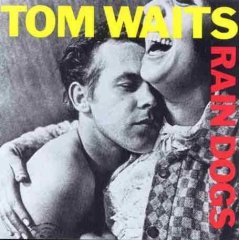
- Rain Dogs (Island album 1985)
The album that is generally recognised his being his best. 19 songs of pure genius ranging from the bizarre pirate shanty of the opening ‘Singapore’ to the all out blues of ‘Big Black Mariah and ‘Anywhere I Lay my Head’ – without doubt one of the best songs to make drunken plans to radically change your life to. Even though everyone, no matter how big a Waits fan they are, has their own opinion of what the best album is, consider this a safe starting point.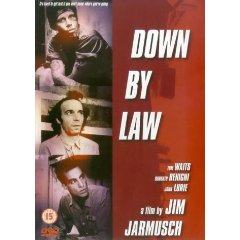
- Down By Law (film 1986)
Jim Jarmusch’s self described ‘neo-beat-noir-comedy’ of three men who find themselves in a New Orleans prison, and eventually engineer a prison break. Also starring John Lurie as a pimp and Roberto Benigni as a hapless Italian tourist in constant need of conversation, ‘Down by Law’ shows Waits as Radio DJ Zack, recently dumped by his girlfriend, his only worthy possessions being his boots. Not only is Waits performance dry, comic and just plain cool, but Lurie and Benigni are equally superb. Add the incredible cinematography into the mix and it is easy to see why it fast became a cult film with memorable lines such as the first encounter between Benigni’s Roberto and Wait’s Zack: ‘It is a sad and beautiful world’, ‘Yeah, it’s a sad and beautiful world, buddy.’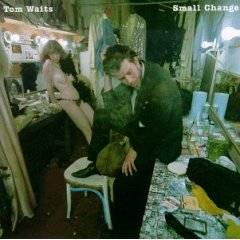
- Small Change (Asylum album 1976)
The ultimate drinking album. Hands down. I defy you not to listen to ‘The Piano Has Been Drinking (Not Me)’ and imagine yourself as the last barfly in a New York dive, drunkenly swiping your pack of Lucky Strikes off the bar as you rest your weather-beaten pork pie hat on your crown, give the bartender a quick nod as he polishes the last of the glasses, and you stumble off into the rainy, neon-soaked night. Or maybe that’s just me.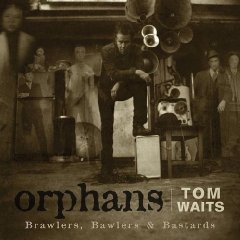
- Orphans (Anti/Epitaph album 2006)
Waits’ latest offering is a 3-CD collection of outtakes, unreleased material and various pieces of musical miscellany, which he classifies into Brawlers (rollicking Blues), Bawlers (melancholy ballads) and Bastards (general insanity). The truth of the matter is that most artists would kill to be able to release albums like these, with such gems as ‘Lucinda’, which tells the tale of William the Pleaser who sold ‘opium, fireworks and lead’, the darkly comic ‘Children’s Story, or his backwood blues version of the Ramones’ ‘The Return of Jackie and Judy’ for which Waits received a Grammy nomination. Remember that these are songs he decided not to put on any of his albums. 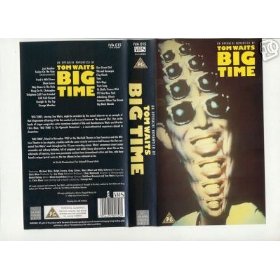
- Big Time (Island VHS Video 1987)
The unfortunate truth about the Tom Waits back catalogue is that live footage is sparse at best. However, if you can get your mits on this then you’re in luck. A surreal mixture of concert and film footage, this 1987 release sees Waits performing material from what many see as the apex of his career, with brilliant versions of ‘Falling Down’ (a previously unreleased track), ‘16 Shells From a Thirty-Ought Six’ and ‘Way Down in the Hole’ (aka the theme music to _The Wire_) where Waits takes on the character of a firebrand preacher who calls upon everyone to ‘go in with our hydraulic system’ and blast that ‘red-horned, lousy, low-life underneath our boots’. On top of this, it has a visual portrayal what sums up Waits’ persona at this point in his career: his heron like frame atop a smoky city roof, brandishing an umbrella on fire, rocking back and forth with a manic grin slapped across his face. Perfect.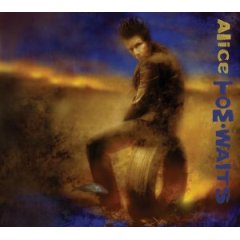
- Alice (Anti/Epitaph album 2002)
My personal favourite. A melancholic masterpiece based on Lewis Carroll’s _Alice’s Adventures in Wonderland_, which was also adapted for the stage by Robert Wilson. It is replete with standout tracks such as the truly heart-breaking ‘Fish and Bird’, the bizarre industrial chug that is ‘Kommienezuspadt’ and the 1920s style ‘Table Top Joe’, which is the account of a piano player born without a body. Overall, this album shows Waits at a lyrical peak; painful songs delivered with husky yet intimate delivery and a superb backing cast of musicians, which earmark this album to be one of the cornerstones of his career.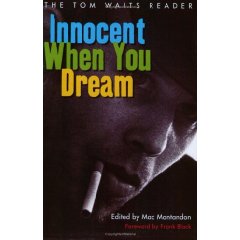
- Innocent When You Dream (Thunder’s Mouth Press book 2005)
Edited by Mac Montandon and with a forward by Black Francis of the Pixies, this superb reader is a collection of interviews and conversations over the course of Waits’ career. Not only do we get to read the transcription of the famous comeback when some Australian talk show host makes a quip about Waits always having a bottle in front of him: "I’d rather have a bottle in front of me, than a frontal lobotomy", but there are also conversations with Jim Jarmusch, Elvis Costello and a transcription of Waits and his _Down By Law_ co-star John Lurie going fishing. A perfect companion to going some way to understanding more about the music and one of the few publications on Waits worth getting.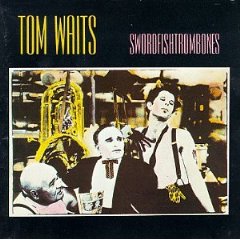
- Swordfishtrombones (Island album 1983)
The album that marked Waits’ departure from the jazz-tinged ballads that had characterised much of his career up until this point. One of his best. With ingenious instrumentation such as with the marimba on tracks like ‘Shore Leave’ and ‘Underground’, the brilliantly comic spoken-word track ‘Frank’s Wild Years’ and the raucous ’16 Shells From a Thirty-Ought Six’, _Swordfishtrombones’_ off-kilter lyrics and matching instrumentation was the blueprint that Waits would modify and implement over the next stage of his career and is simply jaw-dropping when compared with his previous albums.
- Nighthawks at the Diner (Asylum album 1975)
A live recording for an invited audience in 1975 that is a superbly bohemian tribute to the smoky dive bars, greasy diners and hedonistic lifestyle that surrounded Waits persona and influenced much of the music, which he produced at the time. Above all, Nighthawks shows Waits as an entertainer, building up a rapport with the audience, whilst some of his hilarious lyrics and throwaway comments are reason enough to get the album. As with so many of his albums, it makes you wish that you were living that lifestyle and drinking that bottle of bourbon. Fortunately, this album allows you to do that vicariously, even though it’s only for 70 minutes.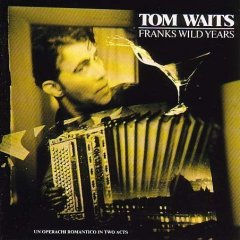
- Frank’s Wild Years (Island album 1987)
Named after a track on _Swordfishtrombones_, a concept album that charts the ambitions of a small-town boy with visions of grandeur, setting off for the big city, gambling himself to ruin and ultimately seeing his dreams fritter away. Although opinion is divided on this album, there is a strong belief that Waits’ theatrical lyrics and musical approach translate brilliantly into the sub-genre that has produced such dire offspring as The Who’s ‘Tommy’. A personal highlight for some weird reason that I have yet to figure out is the keyboard solo on ‘Telephone Call from Istanbul’. Let me know what you think.
